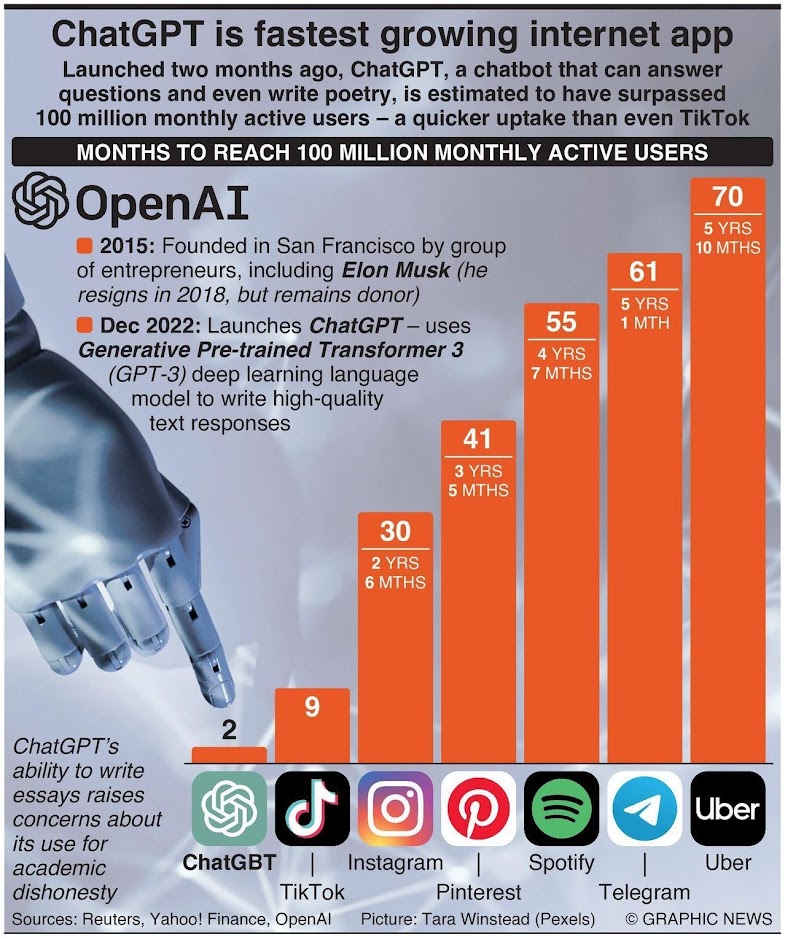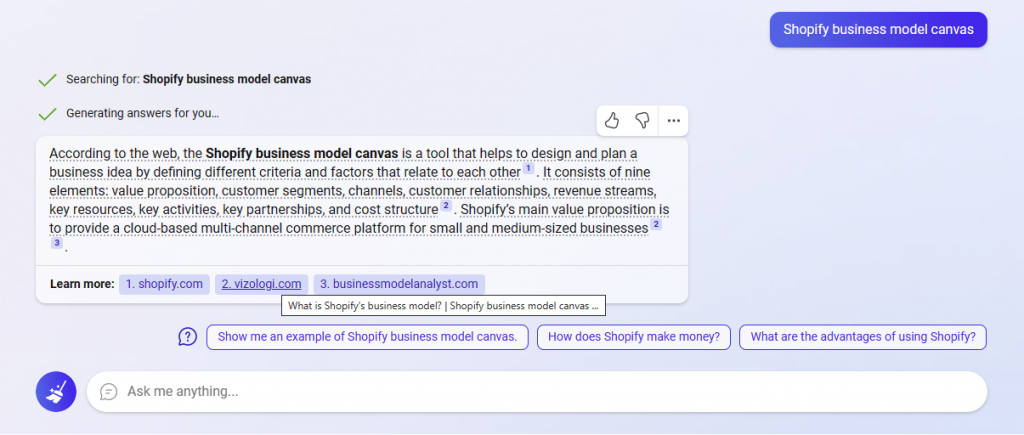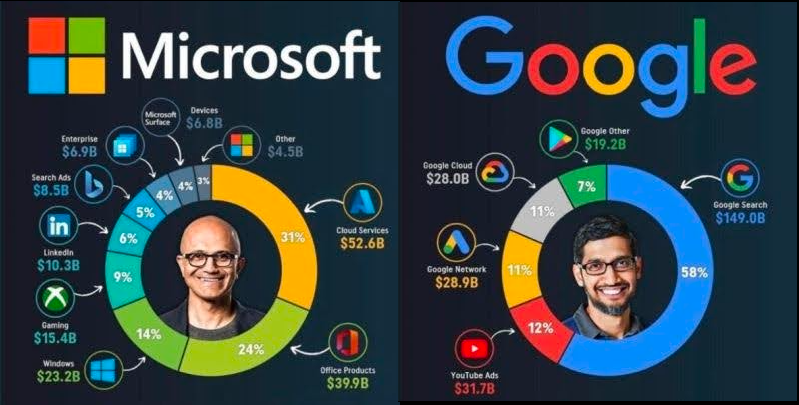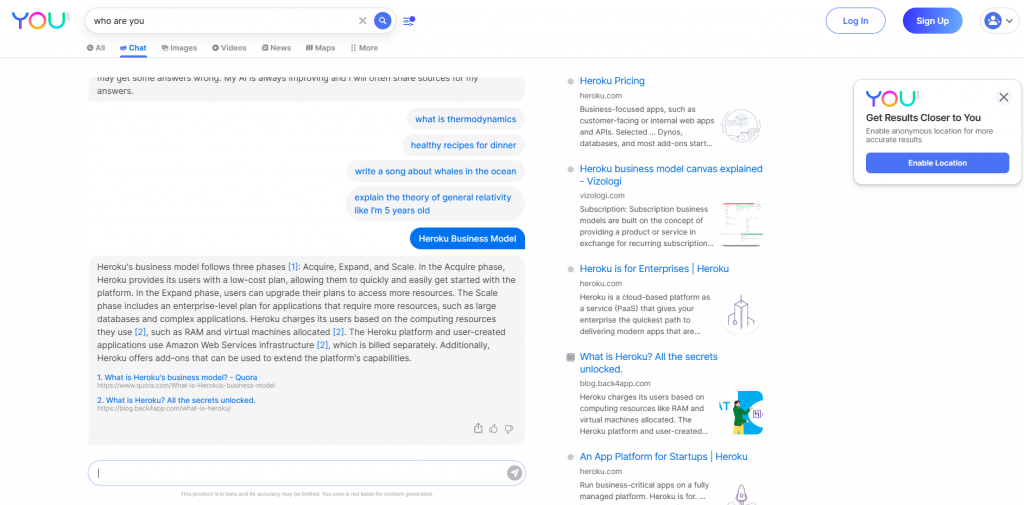Internet in search of a new destination.
It is practically impossible to avoid everything that is happening; we all have our timeline full of news and ChatGPT use cases; Bing released its version of a conversational search engine, and office automation will be generative soon, as I told you in the GPT-3 article of 2020, the Office suite of 2022 was going to be scary, I was ahead by a few months, but the launch is imminent, and nothing more and nothing less than Microsoft and Google went to war; As in all wars, there will be collateral damage.
Beyond the hype and the speed of the events that are happening, let’s attend and reflect on what is happening; the Internet is mutating, nothing more and nothing less than its search algorithm is changing, the holy grail that no one had dared to touch in over 20 years, the Internet engine, the brain of the Internet is being replaced by a new experience of accessing information through natural conversation and powered by Generative Artificial Intelligence, which experts are giving the IQ of a ten-year-old boy or girl, will soon become the IQ of a 100-year-old Shaolin monk.
We are talking about the fastest mass adoption event in Internet history. Although everything happening is not trivial, it deserves a pause for reflection and analysis.

And it made perfect sense, in the analysis I made about the Metaverse, a priori, it was proposed and bet that the Internet would move to a 3D environment full of colors, fantasy and without URLs, a radical change in the conception of the medium and the interaction with information, a very abrupt change of interface, on the other hand, fans of crypto and web 3 (which I still do not know what it is), pointed to a decentralized and idyllic crypto Internet; What I commented in that article was that it made a lot of sense for AI to become the brain of this new Internet, the search engine.
Reality brings us to that scenario, and it has been a minimal and incremental change with the integration of a conversational bot into the user interface of your Edge internet browser; no big stories, no complexities, and the difference is minimal; The impact is enormous.
Beyond affecting the Google Ads platform’s ad platform business head-on, the change affects all of us who have generated content based on SEO, specifically over 1.9 billion online websites, albeit 400 million are active.
You will have already tried Bing and taste colors. Still, the user experience of Internet search through conversational chat is superior and much more responsive to the classic Google Toolbar, which fails in 50% of searches. The Internet had become the first page that Google returned full of irrelevant ads. What are not ads, with an order nobody understood, except the creators of the “search algorithm”? If you are on that first page, you do not exist; if you are not in the first ten results, it is possible to create a digital business on the Internet, knowing how to rank on that first page.
In the Bing proof of concept, you have your usual Internet classic and a snipped chat on the side, and if you enter the bot, the view is immaculate. The number of links the bot returns to you is not ten on the first page, but 3, 4, or at most 5, which is what I have seen in the first tests. In the massive migration of Internet users to this conversational bot environment, let’s understand that the number of links is drastically reduced. The number of clicks on the links is also reduced because, for quick topics, we will not click to get more information; the response of the AI will be enough.
Then it will be more challenging to rank; how will the links coming from SEO with paid links from Ads coexist in this interface? How to prioritize? With what criteria? In the case of Google Bard, there were not even links in the demo; how do you plan to solve it? How will Internet users access those 1.9 billion websites?
The irony is that this AI model has been trained with the content of those 1.9 billion websites that will be more difficult to access; perhaps in the medium term, it will not only be the artists, designers, or copywriters but maybe all of us who have participated in this Internet data should have a kind of royalty transferred in a tokenized network, including this article I am writing, once published it will belong to the Internet.

There are three main types of Internet queries: navigational, informational, and transactional. They are also called “do, know, and go” queries. The ones in play are the information ones in these first versions; the transactional ones will come later; besides asking it to plan a trip to Mexico, most probably you will tell it in the following query to directly make a comparison ranking of the best airplane offers, and then in the future to now book two seats for you (this last one will be the transactional one).
I have made some tests, asking the chat for transactions of the type, transforming the chat content in pdf, and sending it to me by mail; in all the actions, Bing nodded that yes, it did, but it did not happen, this is where the shots will go when the operating system and your browser communicate speaking in the same natural language.
When this happens, and we have a layer of transactional microservices, interoperable and connected to our conversational AIs, what will be needed is to strengthen security further; one of the big problems we have in the current Internet here will come to a layer of tokenization, here will enter Blockchain, here will join the wallets, everything will make sense.
Digital wallets containing tokens represented as payment methods, ID cards, loyalty cards, etc. Allowing people to decide how much data they share with organizations and even who they sell it to.
The data people give up will be even more valuable than third-party information that is no longer collected in a “cookie-free” world.
Google’s dilemma in the search for a new business model.
For some time, I have been explaining in this blog that sooner or later, Google will face the dilemma of completely rethinking its business model based on advertising and exploitation of user data, not because of the issue of the new Internet AI interface, or because they do not have better AI than Microsoft, it is the typical case that Clayton M. Christensen told in a dilemma faced by the innovator.
In this “Kodak” moment that Google is going through, it is not easy; Kodak had in its R&D department the digital camera and did not launch it for fear of breaking its analog business model, the result, we all know it; Google created the architecture of the transformers that has revolutionized the whole machine learning it is the architecture used in OpenAI, they may have even better models than ChatGPT. Still, the decision is extraordinarily complex; a bad UI (User Interface) that drastically reduces clicks on the links offered by Google takes the band the business of sponsored ads, 58% of the current turnover of Google, and at risk would be Youtube, that’s nothing.

I have always commented that this Internet model based on ads, despite having been very profitable, causes rejection to all parties except Google; Internet publishers do not receive fair compensation for the value provided; for buyers of advertising, it is becoming more expensive and less effective conversion, and for Internet users, according to recent surveys, 86% of people feel a growing concern about the privacy of their data.
All this was happening and is still happening long before Microsoft declared war with Bing; they have taken a gamble, they have nothing to lose, and their market share of Internet searches is between 3% and 4%, so they do not lose anything in this launch of Bing, on the contrary, they can gain market share. Still, it is not the core business of Microsoft; its core is the cloud and the Office suite of products.
In any case, both should be doing numbers, more than the interface and dynamic problem of links and clicks that the new Internet AI brings us; there is a critical issue of costs; the cost per AI query is much higher than the cost of traditional search.

Google with Bard can multiply considerably the operational cost of servers and GPUs; they have a search market share of 93%, then the business model is broken here; if they finally decide to go out with a 100% free Bard, they eat their core business, and incur in some stratospheric processing costs, reduce margin and then would raise even more the price of CPC, a click could cost you the same as a gin and tonic in Ushuaïa in Ibiza.
Bing is going to lose a lot of money these months, but its cost with a 3% market share is much lower; they will hold on, however, they can and for as many months as it takes to take market share from Google, even if they are going to losses, they are at war, don’t forget, Internet search is being redefined.
All AI products of OpenAI and Microsoft are in losses; in the case of the first one, they are already over 2.5 billion and almost eight years since the foundation of the startup, but the profit in the next three years is going to be brutal, you have to lose a lot of money, to make a lot of money in technology, you have to take very high risks, this is what the game is all about.
In this scenario, it is time to wonder if a subscription model with payment for Internet access could be imposed; it would be very radical to think that we would pay for a service that has always been given to us “free,” but time to time, maybe they will not ask you to pay only and exclusively to use their bars or search bots. Still, they will bundle, unify services, and pay for them indirectly along with your Office suite of products, for example, or that you pay for it as a paid add-on to your operating system.
No doubt there will be a transition period; you can access the classic Internet selling your soul to the devil and your data for free, and you will have the option to enter Internet IA. This superior model respects your privacy and data, being paid by subscription or embedded in other adjacent and complementary products.
In 20 years, we will say in our conversations, Do you remember when the Internet was a list of links that tracked all your actions and personal data and read all your emails and communications? How did we allow it? Or even more, inequality will be provoked; the one who wants to continue selling data will be seen as being in a lower social stratum, and the one who can pay to get out of there will climb the social ladder.
Conclusions.
We are beginning to take the first steps in this new Internet AI, the scenario is unique, and anything can happen; we are indeed all in beta mode with proofs of concept; Keeping an intermediate position, I do not think that the use of AI will completely load the hyperlinks structure of Internet classic, nor on the contrary, instead we will use a hybrid model that will evolve to assist us in any task, what we do not doubt that it has already merged, Internet with AI, and this will be the beginning of a long story.
If you give me to choose between Google or Bing, I will tell you that neither of two I will choose YOU.com; it is the only one that gives control to the user, and it seems to me the best-finished proposal in terms of design, in which the structure of links coexists perfectly with the power of the generative bot, it allows you to segment by work themes, and it is the most respectful proposal of the market with personal data, it is straightforward, choose your preferences, make a preset of how you want to customize your search on the Internet, and go to work, privacy problems solved.


Vizologi is a revolutionary AI-generated business strategy tool that offers its users access to advanced features to create and refine start-up ideas quickly.
It generates limitless business ideas, gains insights on markets and competitors, and automates business plan creation.


